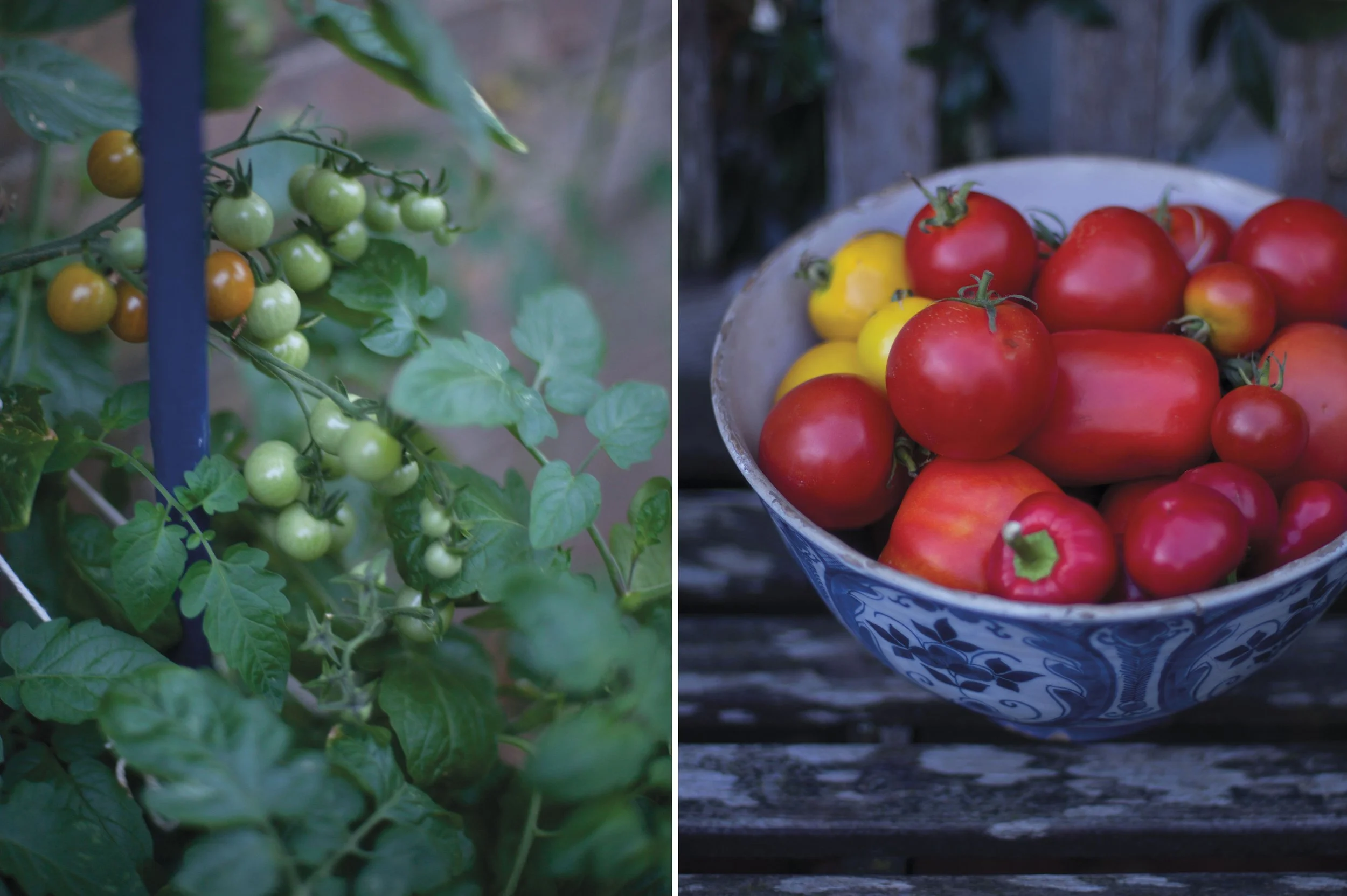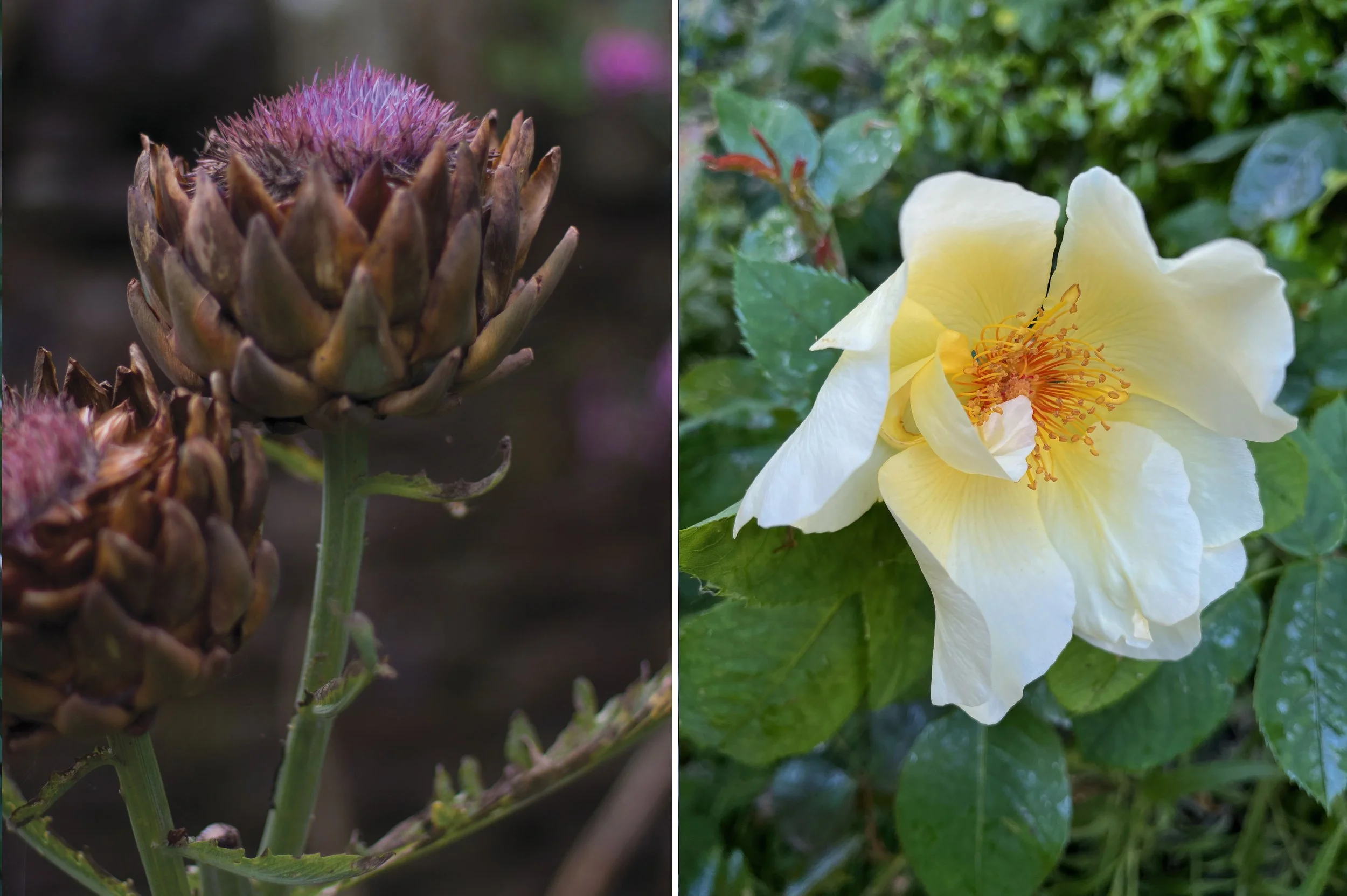a growing family
Growing my own fruit and veg is something I find wonderfully grounding. I love getting my hands into the fertile soil, and watching seeds germinating and growing is magic. I run outside to the garden daily to see how everything is progressing – and to keep a sharp eye on the notorious Cardiff slugs and snails!
With my granddaughter Frida, harvesting potatoes in the garden in Cardiff
Growing is in my blood. Both my grandfathers were gardeners – and both were fantastic people. Grandfather Robinson was seriously wounded in the First World War and his right foot was shrivelled up so he walked on crutches and wore a specially built up shoe. Amazingly, he completely accepted it and embraced life wholeheartedly. Unable to bend down very far, he had a raised bed constructed (quite unusual in those days) in which he grew the flowers mentioned in Milton’s Paradise Lost. He was a numismatist, specialising in the most ancient Carthaginian coins; he had one of pure silver with Pegasus embossed on it. He also enjoyed growing white peaches in an ancient but highly effective greenhouse with a pitched glazed roof and hot water pipes in the wall, fuelled by boilers that were just outside. The peaches were delicious! Whilst the adults sat down to supper together, my brother Thomas and I, with our two favourite cousins, Olivia and Gilly, would creep under the dining room window in utter silence and then race down to the walled garden where the peaches grew. There is little to beat the taste of a perfectly ripe white peach warm from the sun straight off the tree!
Grandpa Lockspeiser cultivated a wide variety of veg in his large garden in Farnborough. During the winter months, witloof chicory was forced (grown in the darkness, to keep it tender) under the matrimonial bed! When I was small he would show me round his large sunny veg patch with delight. And, of course, we ate with glee the products of his labour, prepared by my granny, who was a good cook. Grandpa had extremely demanding jobs – after the War he was Chief Scientific advisor to the Atlee government and later, in the 1950s, he helped set up CERN. He certainly found these roles stressful and I feel that his gardening, along with his music (he founded and conducted the RAE orchestra, now the Farnborough Symphony Orchestra), helped keep him grounded. When he was in nineties, he told me that if he could have his life again he would be a botanist. (He had been an aeronautical engineer – rather dashing for someone born in 1891.)
Granny Lockspeiser had read botany at Royal Holloway College just before the First World War. When she took her children out – my mum and her younger brother, David – they would often take along a large metal container for collecting botanical specimens, slung over one of the party’s back with a large canvas strap. When they got back from their expedition, Granny would get out her botanical dictionary and they would look up the plants together. Now aged 100, Mum is still very good with botanical names. Her mother’s lovely old metal container now hangs on the wall of her kitchen.
Tomatoes grown in my garden in Cardiff
Mum has always been a keen gardener, tending her plants right up until this summer when she started to feel nervous about falling on the paving stones. So she now admires her favourites from her dining room window – notably the roses Mme Alfred Carrière and Ferdinand Pichard. For thirty years my parents had a mill on the Waveney in Suffolk, where Mum honed her vegetable growing skills. The soil there was good for asparagus and artichokes – both globe and the gyroscopic ‘Jerusalem’ types. Sometimes Mum would make ‘stoved’ artichokes (slow cooked in olive oil), and still likes to add a couple of the knobbly tubers to a good, warming winter soup.
My brother and two sisters all garden enthusiastically, two of them growing a substantial amount of their veg. To my great joy my three sons all love veg growing too. Alex, a professional chef, goes in for veg that is a bit out of the ordinary for his professional cooking, like exotic-coloured, exceptionally tasty heirloom tomatoes. Currently my freezer has several boxes of frozen magnolia flowers belonging to him in it, waiting for the opening of his restaurant, Ogof. He’s probably the most experienced veg grower of us all now, but I remember one occasion when Mum remarked that Alex had rung her up sixteen times that day asking questions about growing vegetables! (She was, of course, delighted to pass on what she had learnt over the years.) During Covid Alex volunteered one day a week with Flourish Produce, a ‘regenerative farm’ just outside Cambridge, getting plenty of hands-on experiences along with guidance from the farm’s founder, Calixta. At that point she had a pair of working horses, Bill and Ben, and no tractors.
Mixed planting shows off stunning artichokes flowers, while attracting pollinators with fragrant roses
For many years now I have been growing my vegetables and herbs in amongst my flowers, such as my favourite old-fashioned roses, scabious, honeysuckle and lavender. I’m in good company: Louis XIV proudly presented his newly bred vegetables in his herbaceous borders, too. Initially I didn’t realise that this unconventional approach promotes biodiversity, and was delighted to read recently that Flourish now cultivates flowers specifically for that very reason. Whenever I go to the beach, I like to gather seaweed to enrich my garden’s soil. (It is permitted to harvest seaweed by hand, provided it is unattached to rocks. The greatest quantity is usually found at the high tide mark, especially after a storm.) I also have a good-sized compost heap of two bays, side by side. My whole family composts and there’s often a discussion about the health of our various compost heaps when we talk on the phone!
Growing gives my family enormous pleasure and is always a hot topic of conversation.



